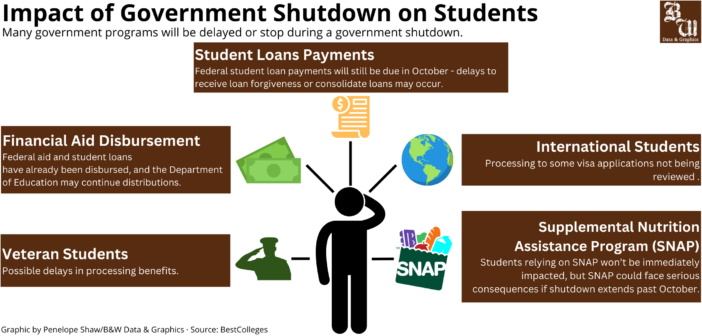Disagreement and a lack of support for bipartisan solutions in the United States House of Representatives brings the possibility of a government shutdown closer to reality.
Congress avoided a shutdown on Oct. 1 — which would cease all non-essential governmental operations — by passing a stopgap funding bill. The bill funds federal agencies for 45 more days, extending the deadline for Congress’s approval of appropriation bills to Nov. 17.
Democratic Rep. Susan Wild, who represents Bethlehem, said avoiding a shutdown and passing a long-term spending bill is a top priority for her and the Democratic Party.
She said the government shutdown in 2019 caused an $11 billion reduction in the national economic output, with $3 billion never recovered.
This shutdown, Wild said, would be detrimental to the national credit rating, which was already exacerbated by the latest debt limit crisis.
“It’s also incredibly unfair to American families,” Wild said. “It stops resources during a period of a shutdown that are very much depended upon by many people.”
If the shutdown occurs, the Small Business Association Loan Program would halt, and essential federal employees such as TSA agents, military personnel and FBI agents would be required to work without pay.
The Supplemental Nutrition Assistance Program would be able to continue providing benefits with reserve funds as long as the shutdown does not last longer than several weeks and if state and local governments stepped in to fund it.
Chad Meyerhoefer, the economics department chair, said states may hesitate to provide supplementary funding for programs like these in the long term because the federal government will not guarantee reimbursement.
He said the program is jointly administered by federal and state governments. All the money comes from the federal government, but state governments run the enrollment process, distribute the funds and manage the program’s operations.
Meyerhoefer said if states and municipal governments decide to fund these programs it will be very uneven.
“You’d get a situation where, for example, in a wealthy area, the school districts would continue to serve those meals at a reduced price and just pay for it themselves because they have money,” Meyerhoefer said. “But in a poor area, where there are more low-income children, they don’t have the money.”
Meyerhoefer said the South Side would be the most affected compared to other parts of Bethlehem.
According to the Census Bureau, Bethlehem has a per capita income of $35,558 compared to the national average of $37,638.
Medicare is funded and managed by the federal government, and even though the payments don’t require congressional appropriation, the system needs money from Congress to function.
In the event of a long-term shutdown, Meyerhoefer said Congress could stop enrolling eligible people in Medicare.
Although the Lehigh Valley has a significant federal workforce, Meyerhoefer said other industries in the area would prevent cuts in sales and labor such as those seen in a recession.
Economics professor Ahmed Rahman said businesses and other organizations in the Lehigh Valley have helped pay costs federal employees enduring in previous shutdowns.
He said layoffs and furloughs of non-essential workers in federal institutions would be managed in the short term.
“As time progresses, it becomes increasingly clear how important (non-essential government employees’) role is, in terms of information gathering (and) in terms of executing various strategic plans,” Rahman said.
He said the government may see greater difficulty hiring competent workers as the uncertainty of shutdowns may undermine individuals’ perception of job security. The challenges a shutdown presents to government employees may also, in his opinion, discourage them from public work.
“It dissuaded me a little bit,” Rahman said. “In fact, that’s not the only reason I’m here at Lehigh and not still at the Naval Academy, but I’ve got to admit, that governmental shenanigans, that kind of disruptive thing definitely was a souring element for me.”
Kevin McCarthy, the former Speaker of the House of Representatives, was voted out on Oct. 3 in a 215-210 vote, marking the first removal of a speaker in U.S. history.
Two Republican nominees for the speakership have failed so far with Jim Jordan, the second nominee, campaigning for the position and ending with three consecutive failed votes.
Wild said without a speaker, the House cannot vote on any bills, including funding bills, and aid for the Hamas-Israel conflict or the war in Ukraine cannot be finalized.
“It’s a little hard to imagine how we’re going to manage to get all of that done, all those spending bills and so forth, given the current state of chaos here with no speaker,” Wild said.
She said the Democratic caucus is ready, willing and able to negotiate a bipartisan compromise on both spending bills and House leadership.
“(Minority leader Hakeem Jefferies) has not been approached even once by the GOP with any kind of offer to try to come to some sort of compromise that would give them enough Democrats to get the house reopened,” Wild said.






Comment policy
Comments posted to The Brown and White website are reviewed by a moderator before being approved. Incendiary speech or harassing language, including comments targeted at individuals, may be deemed unacceptable and not published. Spam and other soliciting will also be declined.
The Brown and White also reserves the right to not publish entirely anonymous comments.
1 Comment
Please shut the Govt down. It’s the only way to get the appropriate attention to the spiraling debt crisis.